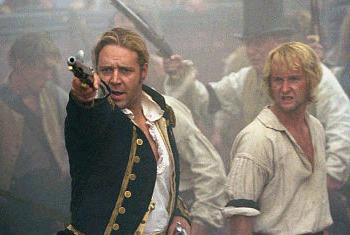But first, an irrelevant but amusing anecdote:
I’m at the Paramount multiplex in downtown Montreal for the Friday, 1:55 show. I make a stop at the little boys’ wee-wee room and who do I see taking a piss? Quebec Prime Minister Jean Charest. I’ve long hoped for the chance to tell him face to face all the contempt I feel for him, but seeing this small, pudgy, poodle-haired man with his dick in his hand… Didn’t feel right. I do my business and move to auditorium 8 and what do you know, so does Charest, accompanied by his teenage son and a not so discreet bodyguard ten steps behind. So there, I can say I watched “Master and Commander” with the freakin’ Prime Minister.
Now with the review:
The film is set in 1805, as Napoleon Bonaparte and the French Empire are spreading across the world – only Britain somewhat rivals France’s might. The HMS Surprise, 28 guns, 197 souls, commandeered by Capt. Jack Aubrey (Russell Crowe), is ordered to sink or take as a prize the Acheron, a great French military ship sailing down the coast of Brazil.
That’s pretty much all the plot there is. There are various twists and turns in the chase for the Acheron, but I don’t quite understand the strategy. The French ship is bigger, faster and has more guns and more souls, which becomes all the more obvious in an early confrontation where the Surprise is blown away… But then the Acheron leaves, only to come back some days later, again establishing their superiority in battle, then off they go to who knows where, giving the British ship time to take a holiday to the Galapagos Islands and to prepare a surprise attack. Huh?
I hear the film and the Patrick O’Brian novels that inspired it are very much accurate historically and technically, so I’ll assume this makes sense. One thing I have more trouble with is identifying with Aubrey’s “cause”. Why should I root for England, “Want your children to sing La Marseillaise?” “Damn no, let’s get those Frenchies”? There’s a throwaway line late into the film about how Bonaparte is a tyrant, but was the British Empire any more of an example of democracy and goodwill?
The best we can do is just accept that Aubrey and his men are following orders and care for them simply because they’re on the side the film chooses to humanize. The characters do much more than they say, so we don’t get to know them all that much, but there’s a general sense of male bonding, and the friendship between Aubrey and ship doctor Stephen Maturin (Paul Bettany, who also played opposite Crowe in “A Beautiful Mind”) is involving enough; I particularly appreciated the quieter scenes where they duet on the cello and violin. It’s also interesting how a lot of the crew is constituted of very young men – the cabin boys are truly boys here.
Otherwise, the film is most notable as an impressive technical achievement. Just building these massive ships must have been a hell of a task, and we really get to feel that we’re sailing on them. We’re always hearing wind, waves, creaking wood… And when all hell breaks loose, it gets very intense. Naval warfare is brutal, loud with canon fire, with shrapnel flying all around and men struggling for their lives.
As stated, I have some issues with “Master and Commander”, but I still admire it. It’s certainly never boring even though it lasts 138 minutes and it’s exceptionally well crafted by Peter Weir and his filmmaking team. It’s just too bad that its episodic narrative lacks emotion or resonance.

